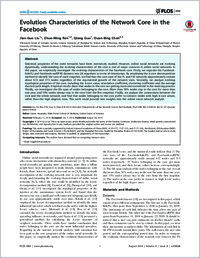Evolution characteristics of the network core in the facebook
- Liu, Jian-Guo Research Center of Complex Systems Science, University of Shanghai for Science and Technology, Shanghai, China
- Ren, Zhuo-Ming Department of Physics, University of Fribourg, Switzerland
- Guo, Qiang Research Center of Complex Systems Science, University of Shanghai for Science and Technology, Shanghai, China
- Chen, Duan-Bing Research Center of Complex Systems Science, University of Shanghai for Science and Technology, Shanghai, China - Department of Physics, University of Fribourg, Switzerland - Web Sciences Center, University of Electronic Science and Technology of China, Chengdu, China
-
28.08.2014
Published in:
- PLoS ONE. - 2014, vol. 9, no. 8, p. e104028
English
Statistical properties of the static networks have been extensively studied. However, online social networks are evolving dynamically, understanding the evolving characteristics of the core is one of major concerns in online social networks. In this paper, we empirically investigate the evolving characteristics of the Facebook core. Firstly, we separate the Facebook-link(FL) and Facebook-wall(FW) datasets into 28 snapshots in terms of timestamps. By employing the k-core decomposition method to identify the core of each snapshot, we find that the core sizes of the FL and FW networks approximately contain about 672 and 373 nodes regardless of the exponential growth of the network sizes. Secondly, we analyze evolving topological properties of the core, including the k-core value, assortative coefficient, clustering coefficient and the average shortest path length. Empirical results show that nodes in the core are getting more interconnected in the evolving process. Thirdly, we investigate the life span of nodes belonging to the core. More than 50% nodes stay in the core for more than one year, and 19% nodes always stay in the core from the first snapshot. Finally, we analyze the connections between the core and the whole network, and find that nodes belonging to the core prefer to connect nodes with high k-core values, rather than the high degrees ones. This work could provide new insights into the online social network analysis.
- Faculty
- Faculté des sciences et de médecine
- Department
- Département de Physique
- Language
-
- English
- Classification
- Physics
- License
-
License undefined
- Identifiers
-
- RERO DOC 231800
- DOI 10.1371/journal.pone.0104028
- Persistent URL
- https://folia.unifr.ch/unifr/documents/303836
Statistics
Document views: 100
File downloads:
- pdf: 148
